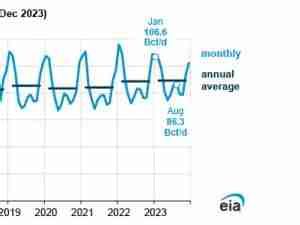Europe’s drive to wean itself off reliance on Russian energy is making headway as the continent increasingly turns to rival suppliers in the Middle East for supplies of diesel fuel.
The share of diesel and gasoil arrivals from the Middle East will surge to 31% of total imports this month, from an average 19% in the previous 12 months, according to data from Vortexa Ltd. Russian-origin cargoes will slump to just 39% from an average of 51%.
European Union states are scrambling to diversify their energy sources before the bloc’s planned prohibition on seaborne Russian fuel imports in February, part of a sanctions package punishing Moscow for its invasion of Ukraine. Elevated natural gas prices stoked by the standoff have led some companies to switch to oil products, further draining fuel supplies.
Europe will need to “pull on Middle East imports as it faces up to the reduction in flows of Russian diesel starting early next year” as the EU sanctions kick in, said Jonathan Leitch, an oil analyst at Turner, Mason & Co.
Arrivals from the Middle East into the continent in September are pegged at about 509,000 barrels a day -- the highest since at least the start of 2019 -- according to tanker tracking and Vortexa data compiled by Bloomberg.
The strong Middle East shipments are helping Europe to counteract the impact of dwindling Russian flows, with the continent urgently needing to rebuild a supply buffer. Autumn refinery maintenance is already limiting diesel supplies in Europe, according to Leitch. Seasonal works in the US and India also have capped exports to the continent, further boosting the call on Middle East supplies.
Meanwhile, inventories of diesel and gasoil in independent storage in Europe’s Amsterdam-Rotterdam-Antwerp hub are languishing at the lowest seasonal levels since at least 2008, according to Insights Global data.
Some European refineries could face unfavorable economics as they struggle to secure cheap supplies to replace imports of Russia’s flagship Urals crude, and as they grapple with high prices for the natural gas they use in processing, said Leitch.
“Conversely, Middle East refiners are sitting on ample supply of local crude, and cheap refinery fuel,” he said.






